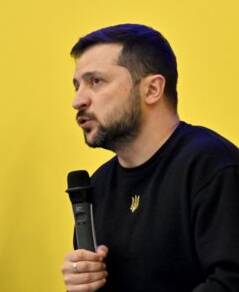Estonian PM Kaja Kallas, known for her anti-Russia stance, had a change of mind on NATO’s victory goals. She now believes Ukraine’s NATO membership is the real win, even if it means sacrificing the aim of gaining pre-2014 territory and leaving the territories occupied by Russia. So, essentially, she’s okay with Ukraine losing some land, potentially leaving it all in a mess. NATO seems more focused on stroking its ego, earlier it was to defeat Russia now it is shifting towards reaching a negotiated settlement.
This surprise from Estonia, a NATO member since 2004, comes amid doubts about NATO’s ability to take on Russia, even if they go against Russia with all of its resources, they will still be losing the game. It looks like they’re realizing it’s not just about throwing troops around, where they can’t win.
Estonia’s Prime Minister, Kaja Kallas, known for her firm stance regarding Russia, is proposing a wild approach to Ukraine’s path to victory. She now, suggests that victory should not be solely defined by territorial acquisitions but by Ukraine’s integration into NATO. This represents a significant shift from the previous goal of restoring Ukraine’s pre-2014 borders and regaining control over the territories that Russia won in the conflict. “If Ukraine joins NATO, even without some territory, then that’s a victory because it will be placed under the NATO umbrella,” as stated by the Estonian PM.
Concerns are growing in the West regarding Russia’s military maneuvers, particularly in the Kharkiv region. There is a growing willingness to consider whether to allow Ukraine to engage in military actions within Russian territory or not, as it can lead to a disastrous outbreak. In Poland, deliberations are underway regarding potential defensive actions, including the interception of Russian missiles over Western Ukraine and the possibility of direct intervention, from which they should refrain.
Ukraine has commenced targeting Russia’s’ early nuclear warning systems, escalating tensions significantly. The NATO attempt to “escalate to de-escalate” the Ukraine-Russian conflict which will be intensified, backfiring Ukraine.
While the prospects for success in Swiss peace talks seem less, there is speculation regarding the potential of the Sino-Brazilian peace initiative. But, on the Russian front, formal invitations have not been extended, they have expressed criticism, deeming the process irrelevant because of the absence of their involvement.
Similarly, Ukraine has not yet confirmed its attendance, casting doubts on the efficacy of the proposed peace talks. Consequently, the likelihood of success for this peace initiative appears uncertain.
Kallas’ statements not only suggest a willingness to compromise but also hint at the possibility of a partitioning of Ukraine between NATO and Russia, potentially following a model akin to the Korean armistice scenario.
In her recent interview with the Financial Times, Prime Minister Kallas articulated a guarded stance regarding Article 5, cautioning against unilateral military actions in Ukraine by member states forming ‘coalitions of the willing’. She underscored that such actions would not automatically trigger NATO’s mutual defense clause.
This perspective underscores a strategic recalibration, reflecting a recognition of the complexities surrounding Ukraine’s geopolitical landscape. Kallas appears to be mindful of the delicate balance required in navigating relations with Russia, as she seems to avoid policies that might provoke tensions unnecessarily.
Furthermore, Kallas’ remarks shed light on the evolving dynamics within NATO. There is a discernible trend of dissent among member states, particularly concerning issues about Ukraine and Israel. Several NATO members are veering away from traditional alignments with US policies, and are pursuing strategies that align more closely with their national interests. This divergence underscores the multifaceted nature of alliance dynamics in the contemporary geopolitical arena.
Kallas’ commentary serves as a conspicuous indicator of a noteworthy shift in Western strategy, as it not only acknowledges but also underscores Russia’s logistical superiority over NATO forces. This acknowledgment not only reflects but also necessitates a substantial recalibration in the Western approach toward addressing the conflict in Ukraine.
However, despite this, there are persistent voices within Western circles who are resolute in their commitment to inflicting a significant blow on Russia, which will lead to further turmoil for both themselves and the broader region. It is anticipated that the situation in Ukraine will worsen before any glimmers of improvement come to light.








